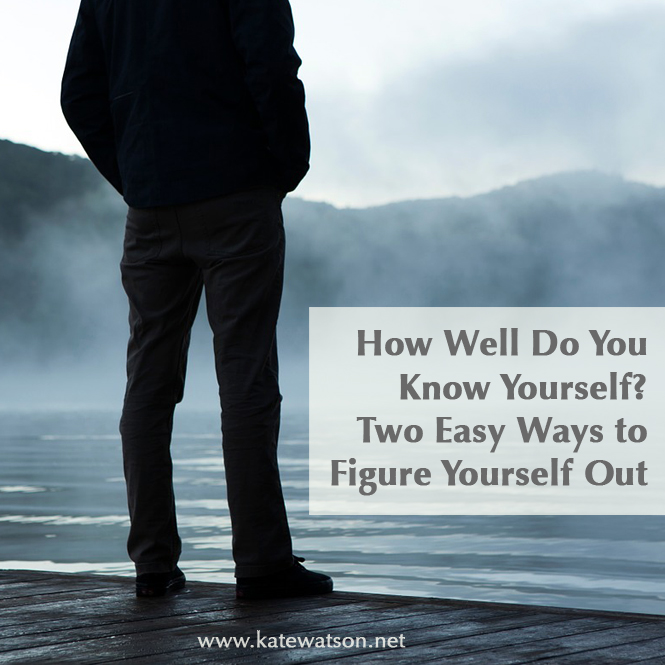
As we continue the getting to know yourself series, it’s time to talk about personality.
Neurologist Paul Roe defines personality as “an individual’s predisposition to think certain patterns of thought and, therefore, engage in certain patterns of behavior.” Personality theory is a branch of psychology that studies individual differences between people, the set of characteristics that influence our understanding of, motivations, and behaviors in various situations.
Embracing your personality is important because each of us needs different things, depending on our natural predilections. I’m a hard core introvert, for example, and while I’m still discovering my limits, I need a lot of downtime at home, alone. My friend Cassandra, on the other hand, says she likes to go out almost every day of the week to feed her extroverted personality.
One of the ways you can come to understand and embrace your personality is through assessments.
Confession: I adore personality assessments!
Disclaimer: I know not everyone feels the same way. While I understand that each of the seven-billion people on this planet is unique and that assessments cannot provide a perfect model of human behavior, I still think they can be informative.
Statistician George Box said, “Essentially all models are wrong, but some are useful.” So I’m going to proceed with sharing a couple of my favorite personality assessments and you can take or leave what you will.
The Big Five Personality Test
Probably the most respected assessment among psychologists is the Big Five Personality Test. It is a trait-based assessment, meaning it places your temperament along a continuum instead of classifying you as a particular type as a type-based assessment would. The Big Five measures:
- Openness, the tendency to be imaginative and independent versus practical and traditional.
- Conscientiousness, the tendency to be organized and disciplined versus impetuous and disorganized.
- Extraversion, the tendency to be sociable and fun-loving versus retiring and reserved.
- Agreeableness, the tendency to be helpful and trusting versus suspicious or uncooperative.
- Emotional Stability, the tendency to be calm and secure versus anxious and insecure.
You can take the assessment for free here.
The Myers Briggs Type Indicator
The most popular personality assessment is undoubtedly the Myers Briggs Type Indicator (MBTI). As its name suggests, the MBTI is a type-based assessment. It measures individual preferences in how people perceive and relate to the world. Specifically, it measures:
- Extraversion/Introversion, from where they derive their energy
- Sensing/INtuition, how they take in information
- Feeling/Thinking, how they make decisions
- Judging/Perceiving, how they relate to the outside world
Your MBTI result is expressed as a series of four letters such as ENTJ or ISFP. There are 16 types in total.
You can take a variation of the test for free or learn more about the official MTBI and take a paid version with personal feedback.
As a reminder, it’s up to you what you do with the results of a personality assessment. I prefer to take what is useful and let go of anything that doesn’t seem to fit or is unhelpful. The goal in exploring your personality is to help you better achieve what you want in life by first understanding who you are and what your unique needs are.
Cheers,

For part six of the getting to know yourself series, click here.
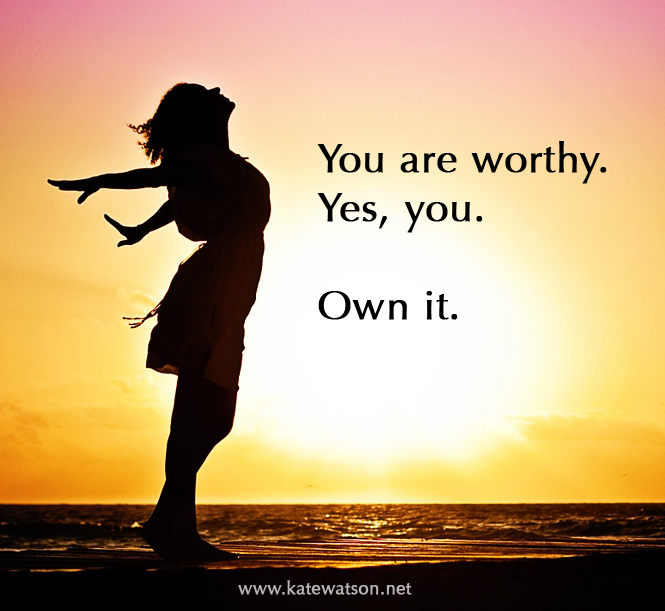
We’re taking a pause in the getting to know yourself series for the following public service announcement:
You are worthy.
Do you get me? Let me repeat myself:
You. Are. Worthy.
Yes, I’m talking to you.
Let me put this in some other common vernacular:
You are enough. You are valuable. You are deserving of love.
The sooner you come to believe that you are worthy, my dear, the better off you’ll be in this life. But I know this is easier said than done.
I had trouble accepting my worth for years. You too may have had people in your life who told you (or made you feel as though) you were not as worthy as someone else. But, regardless of past experiences, we each must come to a place where we truly, deeply believe we are worthy.
You might be wondering: What does being worthy even mean? Merriam-Webster defines worthy as “good and deserving respect, praise, or attention.” Yes, you are all of that.
To further break down the concept, Dictionary.com defines worth as “usefulness or importance, as to the world, to a person, or for a purpose” as in “Your worth to the world is inestimable.” So true.
By the simple virtue of your being alive, you are worthy. You are made (literally!) from the same materials as the moon and stars, and your worth truly is immeasurable.
When I say these things, I don’t mean to imply that you’re better than anyone else. You aren’t. But you are equal, and you are worthy. And that means you’re deserving of respect, love, and a sense of belonging.
Believing otherwise will never serve you. I’m not saying this to make you feel worse if you struggle with self-love. However, the bottom line is that you simply must get to a place where you believe you are as valuable as everyone else. Until you do, you will never be able to achieve all that you’re capable of or live the life you want to live.
When I began my journey toward self-acceptance—more than a decade ago now—I turned to motivational author, speaker, and teacher Louise Hay. In the beginning, I couldn’t say her affirmations with a straight face; I just didn’t believe them. It also took me years to finish reading her seminal work, You Can Heal Your Life.
When I thought about my journey to self-love and belief in my worth, I wanted to share with you one of Louise’s writings that I had printed out and posted on my bedroom mirror back in the early 2000s. As I looked for its citation, I came to realize that what follows must be my adaptation of Louise’s work rather than a direct quote. After all, Louise would have written everything in the present tense, but this is what I was capable of reading and accepting back then:
“I love myself; therefore, I will treat myself with loving kindness.
I love myself; therefore, I will express only positive thoughts about myself.
I love myself; therefore, I will trust the process of my past in preparing me for my future.
I love myself; therefore, I will shine my love for others and allow them to shine their love back to me.
I love myself; therefore, I will trust my body and release myself to the best I can be and it can be.
I love myself; therefore, I will be calm and guilt free.”
Although I now realize it cannot be a direct quote from Louise, I’m going to go ahead and attribute it to her because she was my first self-love teacher, it is based on her teachings, and she is still a significant influence.
Because I found this quote to be so helpful in my own journey, I decided to make a downloadable printable of it for you. It’s a PDF; if you like it, click the link above or the photo below to download and print, save, or share.
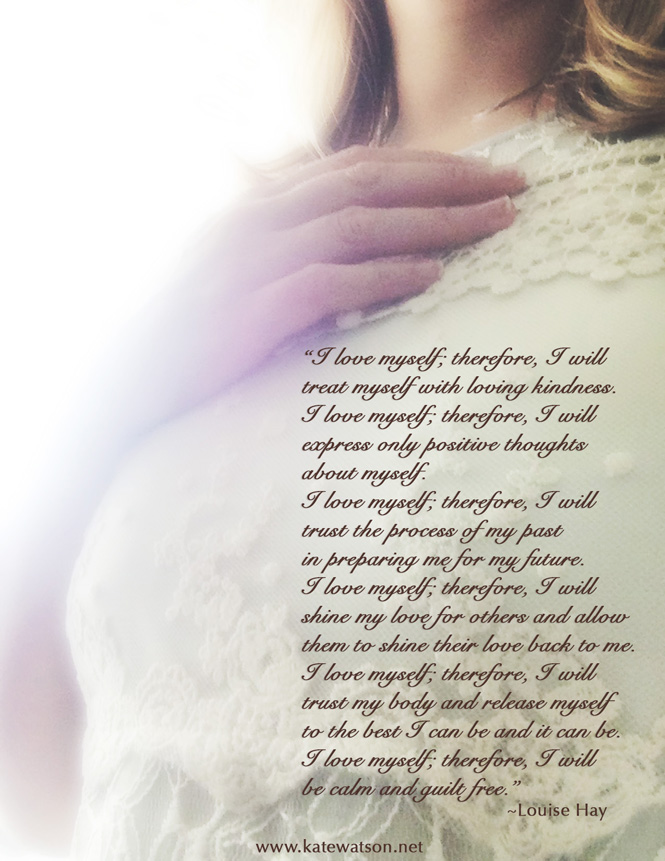
Over time, I adopted another adaption from Louise Hay’s affirmations, “I love and approve of myself just as I am.” To this day, I write that phrase along with a few other affirmations at the close of my daily morning pages.
During this process, I was also helped by thinking in terms of “no better and no worse.” None of us is inherently better or worse than any other living creature. Learning self-acceptance in that way, I’ve found, helps extend your circle of compassion to all beings. Sometimes it may be easier to be compassionate toward others than toward yourself. Extending your circle of compassion in any way you can is invaluable.
And remember, this is a journey. Some days will be better than others. You may begin to believe in your value only to have a major setback. I’ve been there. Keep moving forward. Keep the faith. There is no reason to believe that you are less than anyone else alive and every reason to support yourself into self-acceptance.
You are worthy. I hope these tips for embracing your worth and the printable prove helpful to you. If you have any questions about the process of embracing your worth, shout out in the comments.
When you get to a place where you understand that love and belonging, your worthiness, is a birthright and not something you have to earn, anything is possible. – Brene Brown
Cheers,

For part five of the getting to know yourself series, click here.

Today I’m bringing you part three of the getting to know yourself series. (If you’re just joining in, part one is here and part two is here.) In this post, we’re talking about belief systems, how they were formed, and how they impact us in our daily lives.
Our beliefs provide the lens through which we view the world, how we perceive every encounter or exchange. Our beliefs thus have a profound impact on our experiences.
Do you believe that people are inherently good or bad? Do you believe that people of certain ethnicities, genders, socioeconomic statuses, or religions have certain traits or are “better” or “worse” than another group? Do you think that what happens to you is within your control or not? Do you believe the world is a safe or dangerous place? And most fundamentally, do you believe that you are capable of living a happy life or not?
As you go about your business today, start to pay attention to any beliefs that enter your mind. Here are some places to look:
Beliefs About Yourself
When you first see yourself in the mirror each morning, do you have positive or negative messages for yourself? When you goof up at work, do you tell yourself you’re an idiot or do you say, “Dude, everyone effs up sometimes; you’ll get it next time.”
We all have beliefs about ourselves, thoughts about who we are and our value in the world. Take a moment to write down or think through some beliefs you have about yourself now:
- I believe that I am…
- I believe that my body…
- Regarding my relationships, I believe…
Now that you’ve thought about some essential, personal beliefs, you’re beginning to see whether you approach yourself from a negative or positive viewpoint, and you are able to determine whether your current beliefs serve you—that is, help you to be the best person you can—or don’t.
Beliefs About Others
Continuing the exercise above, think through or write down whatever first comes to mind as you read the following personal descriptors. You could either add “are” and describe that group of people or write a sentence of your own choosing. For example, “[Group of your choice] run the world.”
- Christians
- Muslims
- White people
- Black people
- Latinos
- Asians
- Women
- Men
- Wealthy people
- Poor people
- Heterosexuals
- Homosexuals
- People with disabilities
As you can see, the human population can be segmented rapidly and easily. My list barely scratches the surface of the possible designations we could make between each other in terms of gender, class, country of origin, socioeconomic status, and more. Write down whatever you first think about each group, regardless of whether you think it’s fair, kind, or helpful. What you’re doing is exploring your current beliefs.
You may not have immediate responses for some populations. You may self-include within that group and see its nuances to an extent that you cannot make a snap judgment, or you may be the type of person who tries not to make such judgments. That’s okay, skip it.
This exercise is simply about delving a bit further into who we are by examining our belief systems about other people.
Beliefs About How the World Works
When I was a child, I heard messages from my family like, “The rich get richer, the poor get poorer” and “If it sounds too good to be true, it is.” Whether accurate or not, those messages shaped my belief system.
You undoubtedly heard your own set of messages, which you began to uncover if you worked through last week’s post on unpacking your past and understanding its influence on your present. Today I’d like you to think a little bit more about how your past shaped your views about how the world works. Here are some examples, to get you started:
- You have to work hard to get ahead.
- With hard work, anyone can get ahead.
- People like us never get ahead.
- You have to be smart to get ahead.
- Only rich people get ahead.
You can see where I’m going. What other beliefs do you have about the world and how it works? Think through or write down some of those now, beginning with “I believe…” and writing stream-of-conscious style until you fill a page or 10 minutes pass, whichever takes longer.
Over the next few days, continue to pay attention to the beliefs that filter through your mind as you interact in the world. If you can, add those to your list.
Affirming or Changing Our Beliefs
Once you have a better understanding of what your beliefs are, you can decide whether they are worthy of you. Some beliefs will continue to serve us or the person we want to be while others may keep us trapped in the past or in attitudes that harm our interpersonal interactions or our individual success.
Beliefs generally arise from prior life experiences or lessons taught by our family of origin. At one point, we accepted a message passed on by a family member or concluded that a belief served us, even self-limiting beliefs like “you aren’t good enough.”
If that belief is one of yours—heck, it’s been one of mine—you probably adopted it as protection. It may have kept you safe instead of encouraging you to reach out and try for something bigger, where the stakes were higher, and the potential damage to your self-image may have been greater. That’s okay. It is what it is. But, as adults, we get to choose our beliefs and change them if we want to.
Like I shared last time, acknowledging our truth—who we are and what we believe—is the first step to changing anything that no longer serves us. Stay tuned for more.
Cheers,

For part four of the getting to know yourself series, click here.

Last week, I wrote about the importance of getting to know yourself and provided three basic tools to aid the process. As I thought further about this concept, I realized that I have a lot more to say about it so, over the next few weeks, I’m going to delve into some components that make each of us unique.
The first topic I’d like to address is understanding your past and how it affects your present. I’ve written before about how our upbringing impacts who we become.
Understanding Your Past: The Facts
I’d like you to think for a minute about how your upbringing might have impacted you. If you’ve got the journal I suggested last week, open it up and write down some facts about your upbringing. For example, mine might say:
- White
- Female
- Born to married, college-educated parents
- Grew up in the American south
- Parents later divorced
- Raised by a single mother from age 6
- Lower middle class
- Parents and extended family primarily Republican
These are a few things that are top of mind for me in this moment. Your list might be similar, different, or on another topic altogether. By writing these facts about my upbringing down, I am acknowledging from where I came.
Once you have made your list, would you say it matches that of others you grew up with, or did you feel different somehow? Two ways I felt different from my peers was the size of my family (2) and our household income (less).
Understanding Your Past: The Stories
Have you ever noticed that the events you remember most clearly are emotionally charged? In his books Self Matters and The Self Matters Companion, Dr. Phil calls these Defining Moments and suggests that you catalog and dive into the 10 most influential moments of your life and the stories you’ve told yourself about those times.
To do this, take a look back at various periods of your life—preschool, grade school, high school, college, young adulthood, adulthood, middle age… What memories stand out as particularly important?
When you have noted a few memories, think through the details of one: Note your age, location, who you were with at the time, what happened, and what emotions you experienced. Because these memories are emotionally charged, some might be painful.
If remembering an event is in any way traumatic, you have my full permission to distance yourself from it. Put it away for now or look at it instead from the perspective of your present self.
After you’ve walked through an event, consider: What did this experience teach you? Is what you learned fair, true, and beneficial? Does it serve you now and, if so, how? Repeat this process for your remaining Defining Moments.
Understanding Your Past: The Lessons
Recalling your stories and what they taught you brings me to the next facet of your upbringing: The lessons you learned. The following are some questions to ponder or journal about in order to identify and acknowledge your earliest life lessons:
- I was raised to believe…
- My mother/primary caregiver taught me that life…
- My father/primary caregiver said that I…
- It was commonly understood in my family that…
- My peers taught me that…
The lessons you learned while growing up, like the experiences you remember, may be either positive and negative. You may not have assigned value judgments to them at the time but now you can likely look back and see how some of the things you learned serve you and some do not.
For example, learning not to touch a hot stove or how to persevere serves you. “Learning” that you weren’t as good as your peers, because they told you so, does not serve you.
This exercise is simply about uncovering and acknowledging the lessons you’ve learned so you can better understand who you are and how your upbringing continues to impact you. We’re not here to cast blame on our parents or anyone else. But this is important work.
As Oprah writes in What I Know For Sure: “Like me, you may have experienced things that caused you to deem yourself unworthy. I know for sure that healing the wounds of the past is one of the biggest and most worthwhile challenges of life. It’s important to know when and how you were programmed so you can change the program.
“Doing so is your responsibility, no one else’s. There is one irrefutable law of the Universe: We are each responsible for our own life. If you’re holding anyone else accountable for your happiness, you are wasting your time. You must be fearless enough to give yourself the love you did not receive.”
For the record: I believe that every parent, even those with the best of intentions, screws up their kids in some way. It’s almost impossible not to. But, and this is a big but, most parents were simply doing the best they could at the time.
When you start to look into your own parents’ backgrounds, you’ll see how their experiences impacted the lessons they taught you, intentionally and inadvertently. As Oprah says, it’s our job to acknowledge and heal any programming that doesn’t serve us. So how do we do that?
Awareness is the first step to healing. You can’t heal anything you can’t acknowledge. When you start to acknowledge your past and the the lessons you learned there, all kinds of opportunities for healing unfurl.
“Begin noting how every day brings a new opportunity for growth,” Oprah explains, “how buried disagreements with your mother show up in arguments with your spouse, how unconscious feelings of unworthiness appear in everything you do and didn’t do.
“All of these experiences are your life’s way of urging you to leave the past behind and make yourself whole. Pay attention. Every choice gives you a chance to pave your own road.”
I agree. Accepting the past and moving forward is the only way to live your best life. If you need counseling, get some. If journaling and meditating are enough, make time for those. Your future will thank you.
Cheers,

For part three of the getting to know yourself series, click here.

“Every person born in the world represents something new, something that never existed before, something original and unique, and every man or woman’s foremost task is the actualization of his or her unique, unprecedented and never recurring possibilities.” – Philosopher Martin Buber
Your relationship to yourself will be the longest and most significant of your lifetime. Getting to know yourself seems like a no brainer—after all, you live with yourself every moment of every day—but the truth is, it can be difficult.
First, there are so many factors that make you you: your life experiences, personality, beliefs, values, even motivations. Second, it can be easy to live unconsciously, to do whatever you feel in each moment instead of looking for the larger patterns of your life or living according to the values and creeds that matter to you.
Living unconsciously might lead you to assume your actions are what any reasonable person would choose in a given situation, but that’s not true. You’re a one-of-a-kind individual whose actions and reactions are based on who you are and how your prior experiences have taught you to act and react.
If you want to live more consciously, to become more aware of why you do what you do, then you have to get to know yourself. Over the next few weeks, I’m going to give you some ways to explore your many facets. We’ll start with three basic tools.
Getting to Know Yourself Through Journaling
One of the best ways I know for getting to know yourself is journaling. A journal gives you a safe place to record thoughts you might not want to share with others, to ask yourself questions like “Why did I say that or do that?” after an event, or to note your beliefs.
I’m old school and prefer journaling with pen and paper but, if you’re worried about someone seeing or reading your journal, you could use something like MacJournal and Evernote, which can be password-protected.
Here are five journaling prompts to get you started:
- I believe…
- I remember…
- I don’t want to write about…
- I wish everyone knew…
- The most significant thing ever to happen to me was…
Write for 10 minutes, being as honest as you can. You can always destroy or delete what you wrote later, if it’s too personal. The act of writing it down, however, can give you tremendous insight into who you are.
Getting to Know Yourself Through Meditation
In its simplest form, meditation is simply sitting with your thoughts. Take a few minutes to close your eyes, sit quietly, and observe your mind. Your mind may initially freak out and that’s okay.
If your mind is obsessing over your to-do list, remind yourself that you’ll tend to your list soon. If your gremlins are talking to you—you’ll know because they’ll say things like “you’re wasting your time,” or “you can’t do this,” very negative responses intended to derail you from the activity—acknowledge them and note what they have to say. It may show you where some of your insecurities lie.
Where your mind goes and the tone of your inner monologue tell you a lot about how you think and what matters to you. We all have an inner critic and an inner mentor. The critic speaks harshly and loudly; the mentor speaks quietly and decidedly when you can let the gremlins go.
If you find your mind has gone blank, you can ask yourself questions:
- What has shaped me?
- What do I know for sure?
- How do I define myself?
- What do I wish?
Your answers to each of the above questions helps you delve into your psyche and explore what matters to you. Your past experiences and takeaways impact your daily choices; the words you choose to accept or reject as you define yourself can tell you a lot about what matters to you; and your wishes begin to hint at your motivations.
Getting to Know Yourself Through Pausing
We humans like to act and react. A lot. Pausing to reflect on our actions and observing our reactions can thus be quite powerful.
Take a few moments to pause during your day. Set aside distractions like your earbuds and crackberry and gaze out the window or drink a cup of tea. Think back to a recent event, maybe a disagreement with someone or a time you felt strong emotion. Ask yourself:
- What was I feeling in that moment?
- What was my role in that situation?
- What led me to react as I did?
- How else could I have reacted?
Pausing and observing isn’t about judging your behavior or assigning blame. It’s about being curious, about uncovering what drives you, and exploring how you can become more conscious in your future actions.
I encourage you to keep using these basic tools of journaling, meditation, and pausing as we progress over the next few weeks. I’ll be introducing several new methods of getting to know yourself and it will be helpful to return to these basic tools as you go. You may even want to dedicate a notebook (hard cover or Evernote) for capturing your thoughts and realizations throughout this process.
What is driving you to get to know yourself? How do you think it will help you?
Cheers,

For part two of the getting to know yourself series, click here.
|












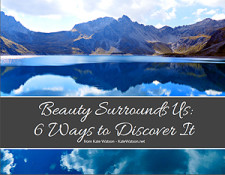
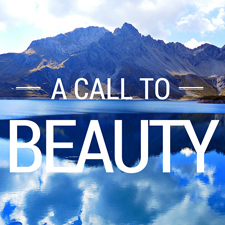
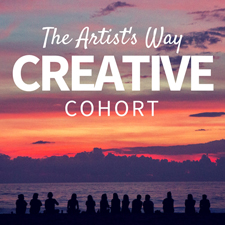







You Are Worthy » KateWatson.net - […] For part five of the getting to know yourself series, click here. […]